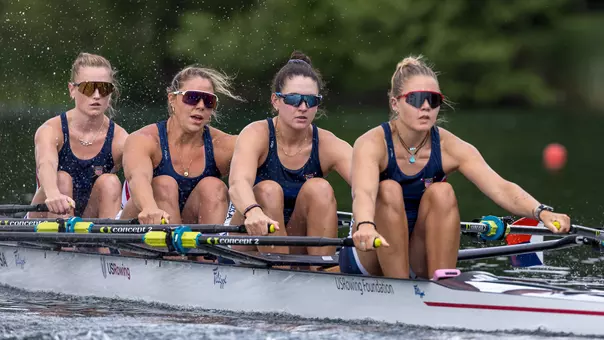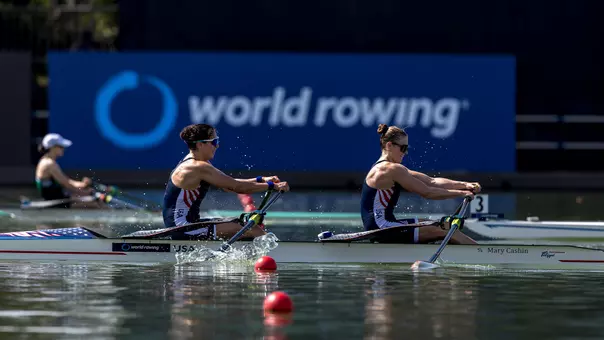Pulling together
May 22, 2015 | Women's Rowing

May 22, 2015
BY CARLY VOGEL
UWBadgers.com
MADISON, Wis. -- The date June 16, 1975, may not stick out as a memorable date for most, but for one special group of rowers and their coach, it is a date that signified the University of Wisconsin's first female national championship, and more importantly, the cementing of lifelong bonds and friendships.
The 1974-75 University of Wisconsin women's rowing team, comprised of coach Jay Mimier, manager Barb Shafer, Karen Ela (bow), Mary Grace Knight, Peggy McCarthy, Jackie Zoch, Debbie Oetzel, Sue Ela, Mary Connell, Carie Graves (stroke) and Beth Traut (coxswain), left behind a legacy of excellence for not only the Badgers crew program, but also UW women's athletics as a whole.
| Get Varsity Magazine | |||
|
Claiming the 1975 National Women's Rowing Association (NWRA) national championship remains such an impressive and celebrated feat 40 years later because the modern era of women's rowing did not begin at UW until the winter of 1971-72. Kathy Wutke, a freshman member of UW's swimming team, is credited as the founder of the first continuing women's crew effort.
Joining Wutke in her effort was fellow women's crew pioneer Sue Ela. She would go on to become an integral member of the program's groundbreaking 1975 championship team, as well as a decorated and well-loved coach for the Badgers.
Wutke, Ela and several others put in countless hours of work to establish women's rowing as an official club at the university. It wasn't until December of 1971 that the women were finally recognized with club status.
The early years of women's crew at Wisconsin brought a variety of obstacles and hardships for the women to overcome. The eager and determined group were challenged with a lack of space, difficulty in training around the men's crew schedule and a lack of funding for travel to outside competitions.
"It was an evolution that involved a lot of elbow work, because there weren't a whole lot of models to follow," said Ela. "We were fortunate to have people around us from the men's program who had competed at a high level so we could have that atmosphere around us. It was extremely hard."
An additional issue facing the women in the early years was coaching. Men's head coach Randy Jablonic and men's freshman coach Doug Neil were instrumental in helping the women to begin their club, however, they became stretched too thin while attempting to coach both the men's and women's teams.
In the spring of 1973, the issue was resolved when former men's rower and UW law student Jay Mimier took over the program. Mimier pushed the women with a rigorous training schedule and competitions against some of the nation's best varsity and club rowing teams.
Major strides for women's crew were made in May of 1974, when the UW Athletic Board voted to add an 11-sport women's intercollegiate program that included openweight crew. The 1974-75 season thus marked the first time women's rowing would compete as a varsity sport at Wisconsin.
Despite its varsity status, the 1974-75 team was still comprised of many newcomers to the sport -- but that did not deter the women from training and competing to win.
| "As we came across the finish line everyone had given it their all, and the crew was exhausted but exhilarated," said Traut, the coxswain. "It was an amazing day, and we all were so happy to have realized this goal. It certainly created a bond among us, but at the time I'm not so sure we realized how strong that bond was." -- Beth Traut |
"None of us had prior athletic experience to speak of since Title IX was just kicking in," said Graves, stroke seat and captain for the 1974-75 boat and an eventual three-time Olympian. "Four of us were from farms and the other four had only a bit of athletic experience from figure skating or ballet. We had a lot of fun at Wisconsin seeing how hard we could push ourselves and each other."
The group's mental toughness and special camaraderie would become two of the biggest factors in its unprecedented success. UW women's rowing competed as a varsity sport for the first time in the Midwest Championships on April 26, 1975, claiming the first of what would become an unbroken string of 25 consecutive victories as a varsity eight.
"Something that continues to stick out to me was just the great work ethic that all of us seemed to have," Ela said. "There really weren't any cuts. Instead, people self-selected, and if the work was too hard, they left. The ones who remained were bonded together just by the sheer toughness it required, and the camaraderie was amazing. I've never experienced such camaraderie before, or since."
The crew culminated its impressive first season as a varsity sport with the NWRA National Championships on June 16, 1975, racing on a 1000-meter course. At the time, the national championships not only included the country's top college programs, but the field also comprised of well-established national rowing clubs.
"We went in planning to win, but on the other hand we knew that we were going to be competing against club teams who had pooled together some top athletes, Vesper Rowing Club being the dominant one," said Ela. "I think we went in feeling pretty much like an underdog, but we were very determined."
In its first race of the regatta, Wisconsin (3:34.5) finished third in the faster heat, qualifying for the final behind Vesper Boat Club of Philadelphia (3:30.7) and the Eastern Development Camp from Boston (3:32.0). Yale, Princeton and Cal were the three schools to qualify from the slower heat.
Entering the final race, Mimier and his team barely spoke of winning at all. Instead, the group remained focused on rowing their hardest as a cohesive team, which they all believed to be more important.
"When we got to Princeton and the national championships, our goal was to leave everything out on the water, nothing left," Graves said. "We never talked about winning, we just talked about how much we needed to give."
UW's spirited and determined strategy paid off, as the varsity eight crossed the finish line a full 3.3 seconds before the race favorite, Vesper Boating Club. The official race results placed Wisconsin as the national champion (3:07.3), ahead of Vesper (3:10.6), Eastern Development Camp (3:15.2), Yale (3:24.4), Princeton (3:24.8) and Cal (3:26.1).
"As we came across the finish line everyone had given it their all, and the crew was exhausted but exhilarated," said Traut, the coxswain. "It was an amazing day, and we all were so happy to have realized this goal. It certainly created a bond among us, but at the time I'm not so sure we realized how strong that bond was."
Following the NWRA championships, members of the historic varsity eight initially went their separate ways. Graves, McCarthy and Zoch were selected as members of the U.S. team that went on to win the bronze medal at the 1976 Olympics, while Sue Ela took over the Wisconsin program from Mimier, her eventual husband, following the 1978-79 season.
Although distance and varying life events have separated the special group of women, their incredible national championship cemented a bond that continues to last.
"Following nationals, I expected to go on with my life, school and hopefully row with some of these women during my last two years of college," said Traut. "I never expected to share my life with these eight other women."
Twenty years following the national championship, in 1995, the U.S. Masters held a national competition at Lake Phalen in St. Paul, Minnesota, which was the location of one of the crew's first races as a team. The same varsity eight from the 1974-75 season decided to compete together once again.
With only two days to practice and rig the boat, the 1975 national champions displayed a strong showing, finishing in second place. That same crew would continue the tradition every five years until its last Masters race in 2010, winning world masters gold in 2000 and 2005.
This June marks the 40th anniversary of the groundbreaking women's crew championship. However, instead of reuniting on the water, the varsity eight, their manager and their coach will be spending the week in Colorado to hike, catch up and reminisce about that amazing day at the 1975 NWRA National Championships.
"It's not about any one of us, but about the team as a whole," Traut said. "We all came together at the right time to represent UW, win a national championship, and create bonds that will last each of our lifetimes."














